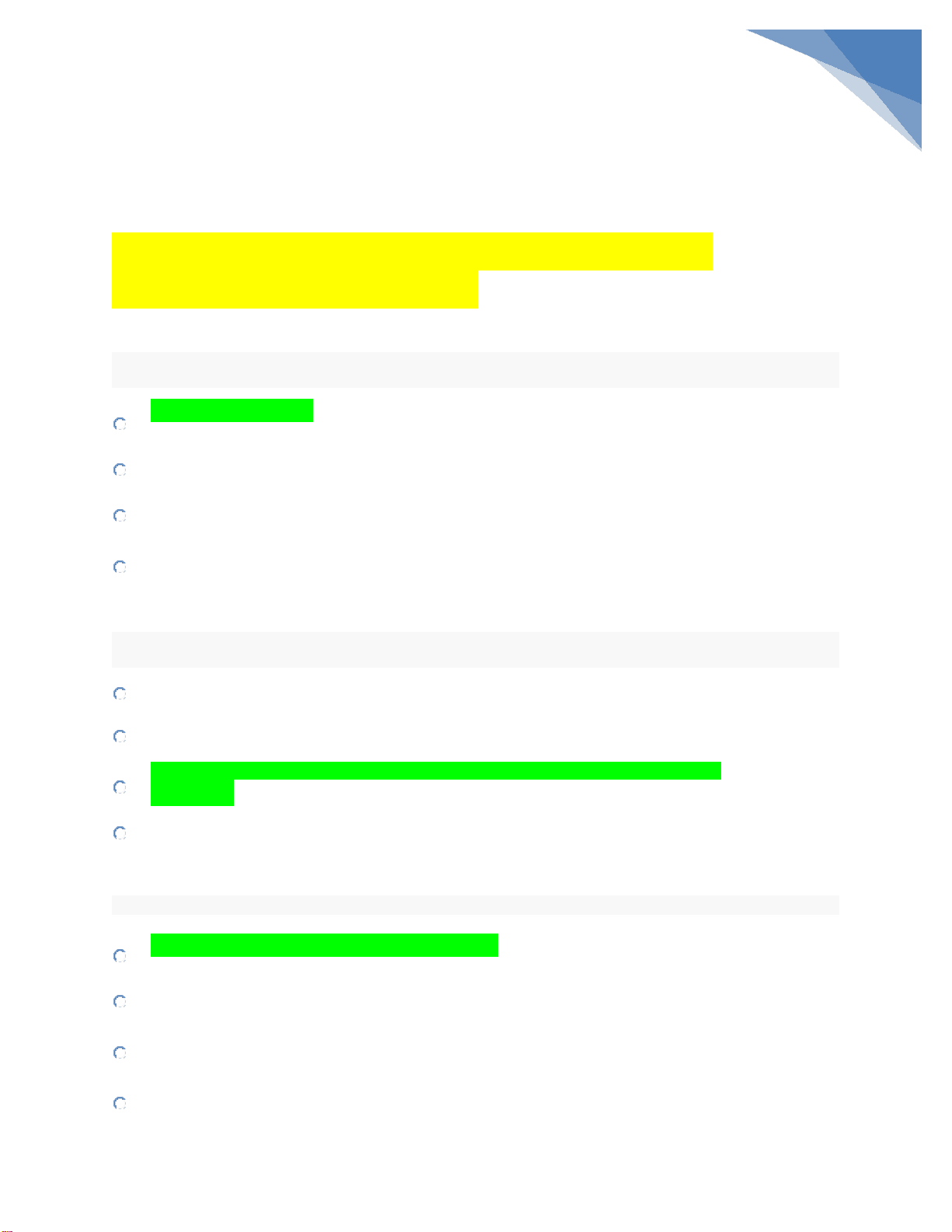
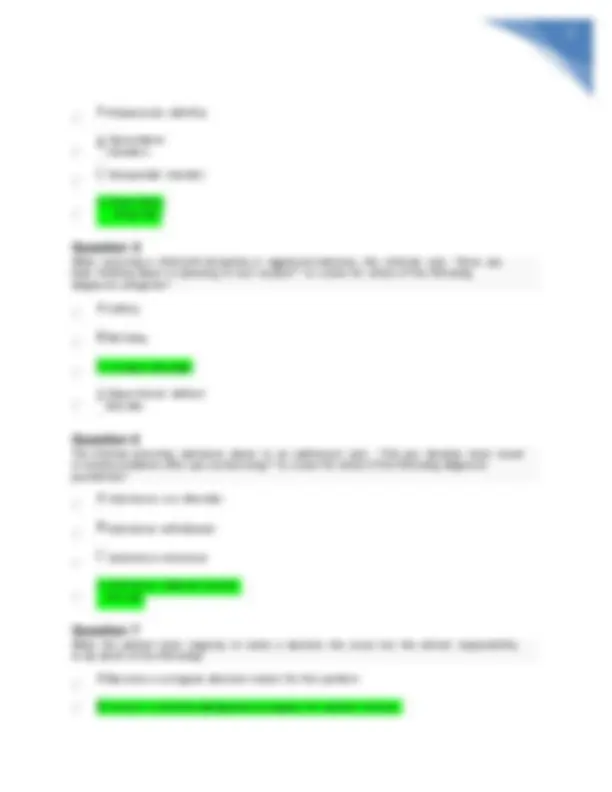
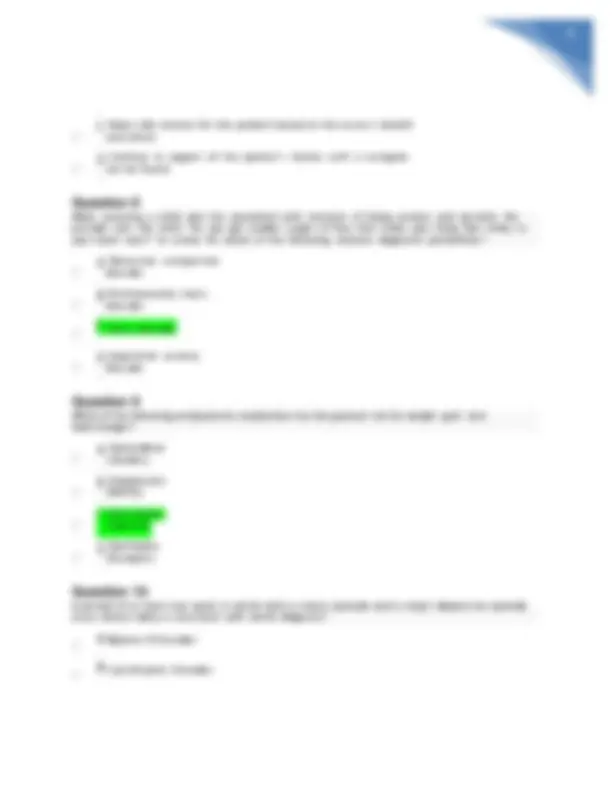
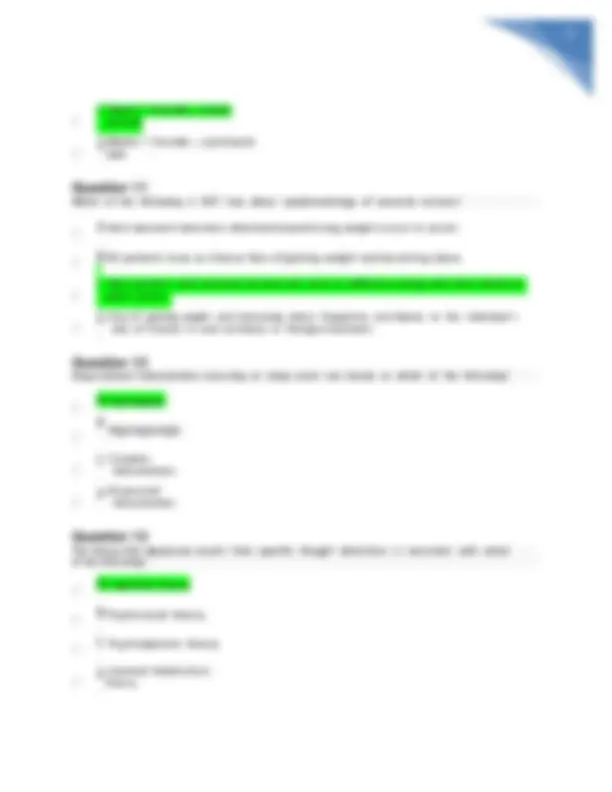
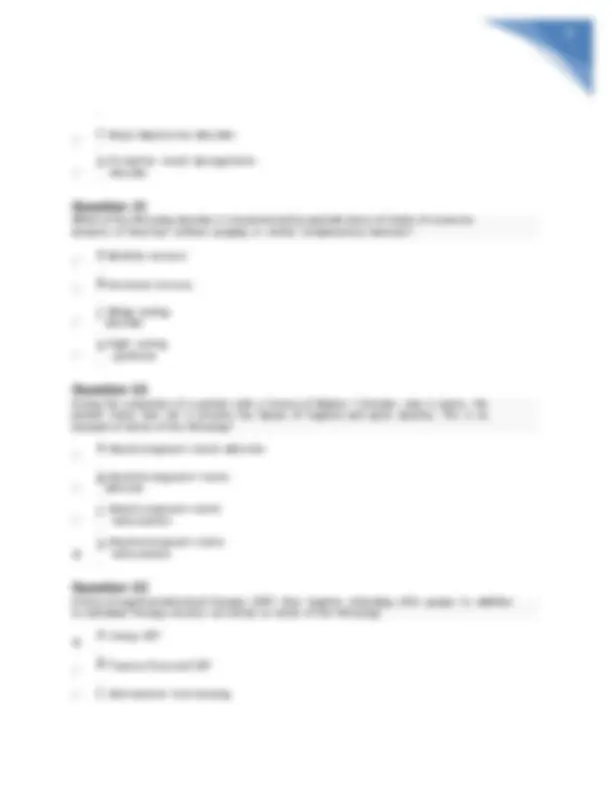
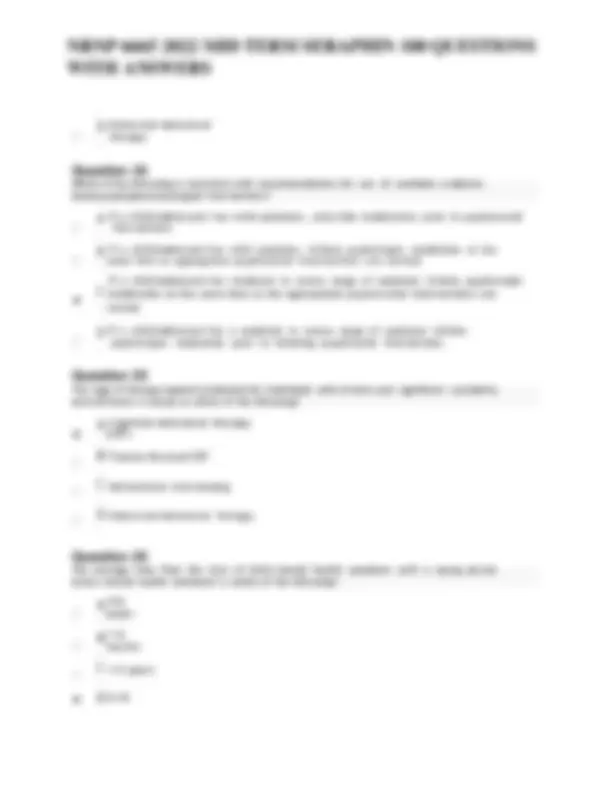
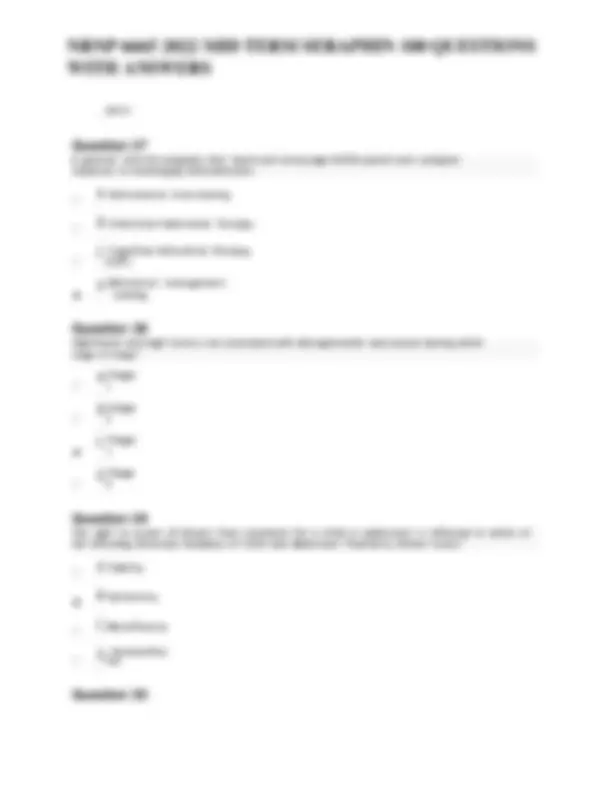
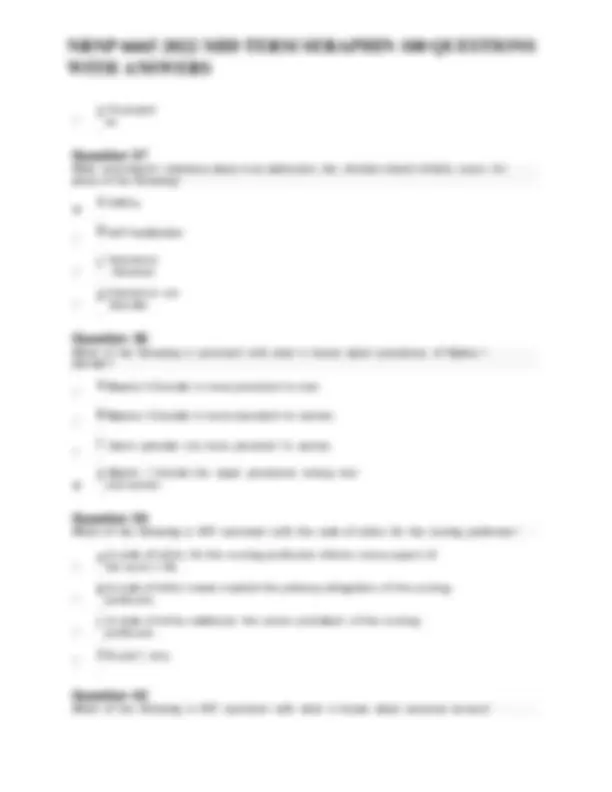
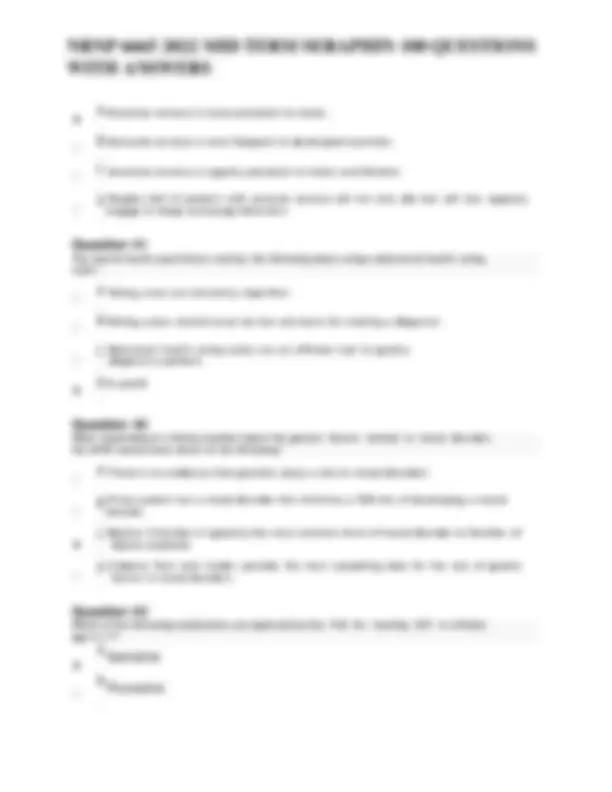
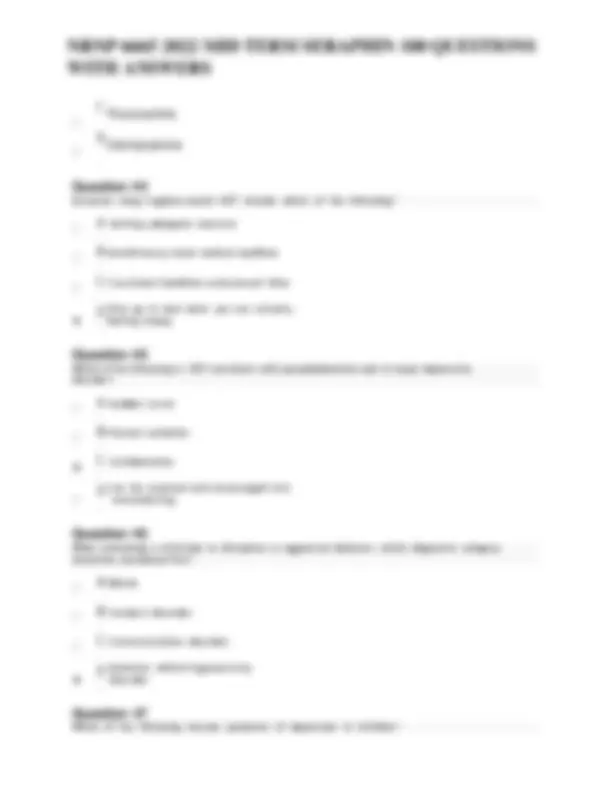
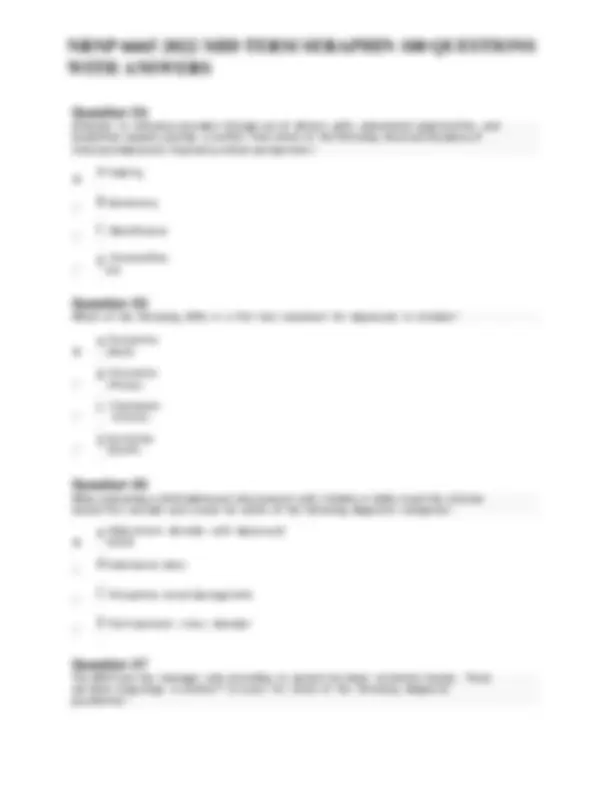
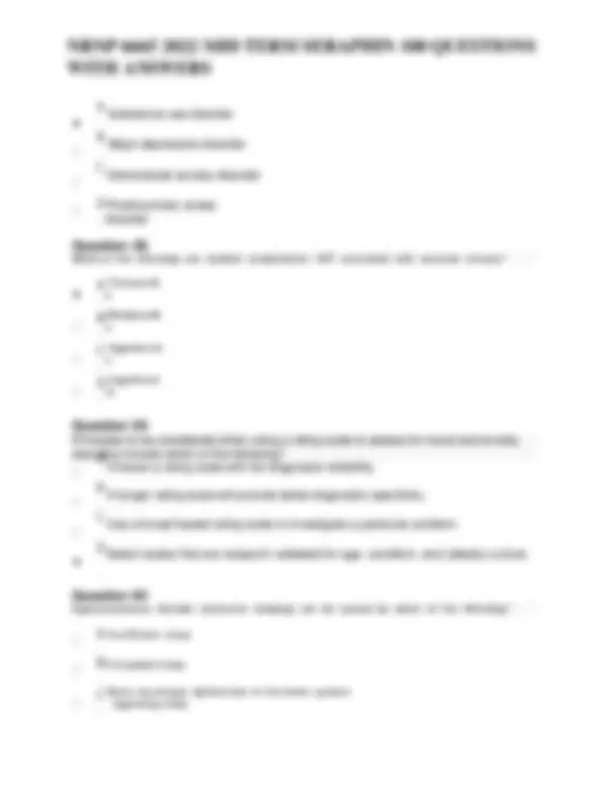
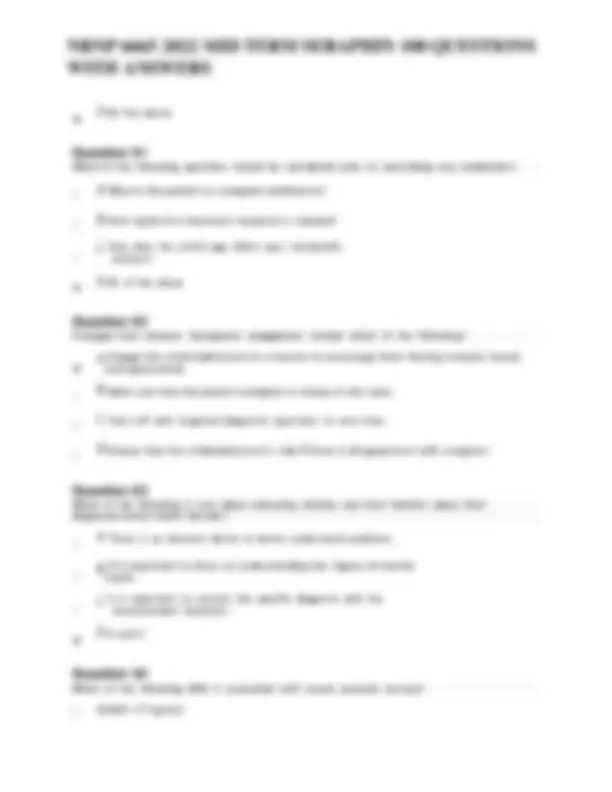
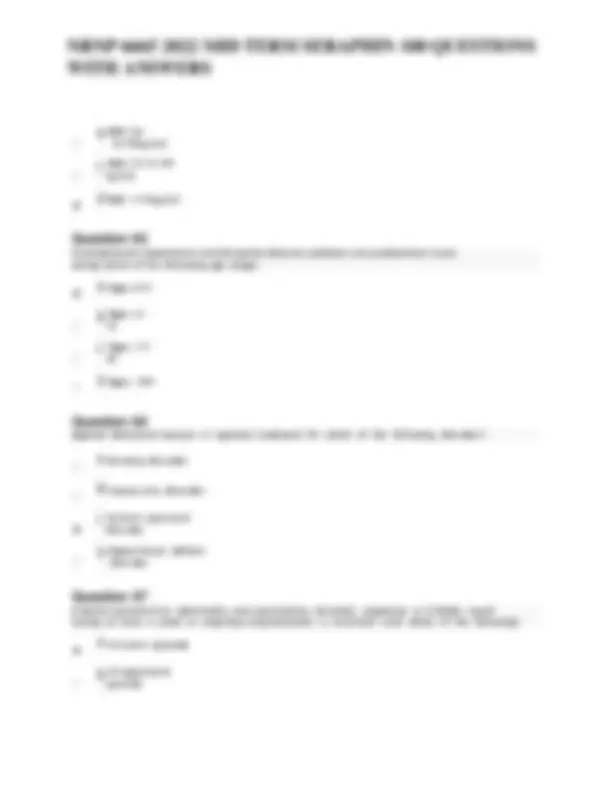
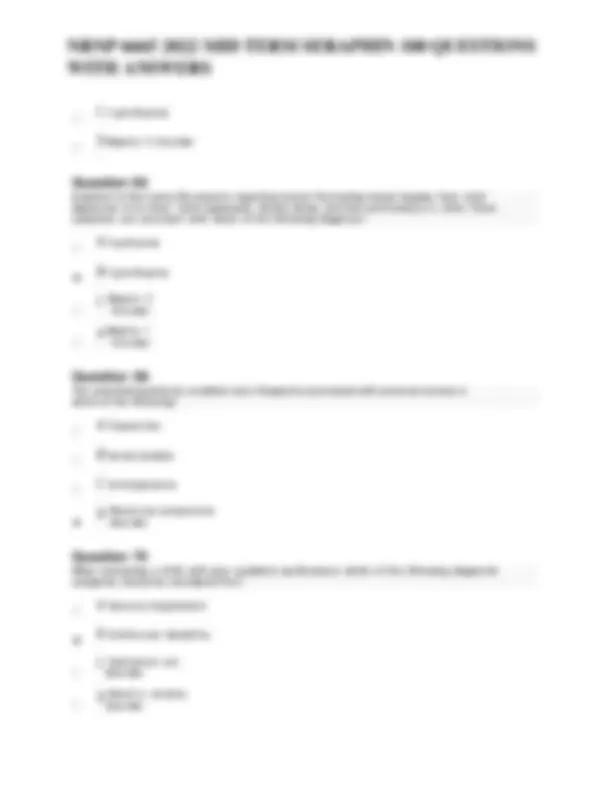
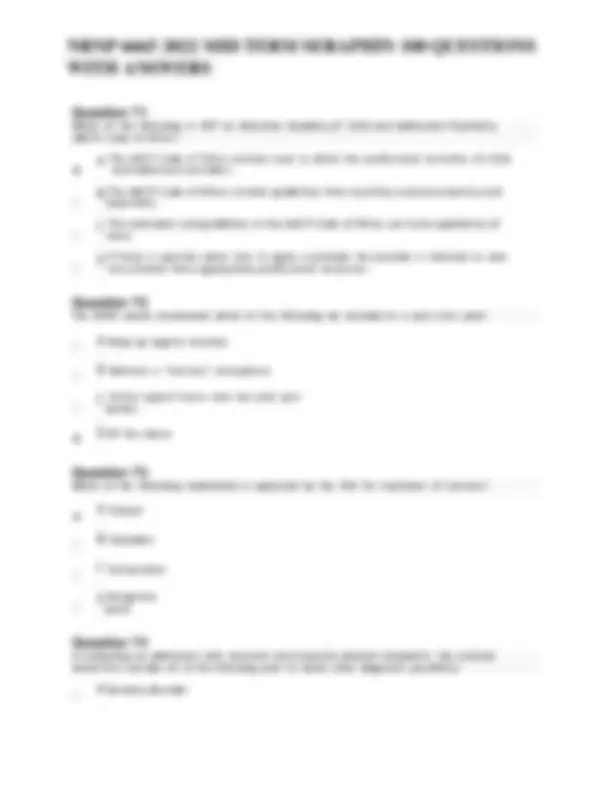
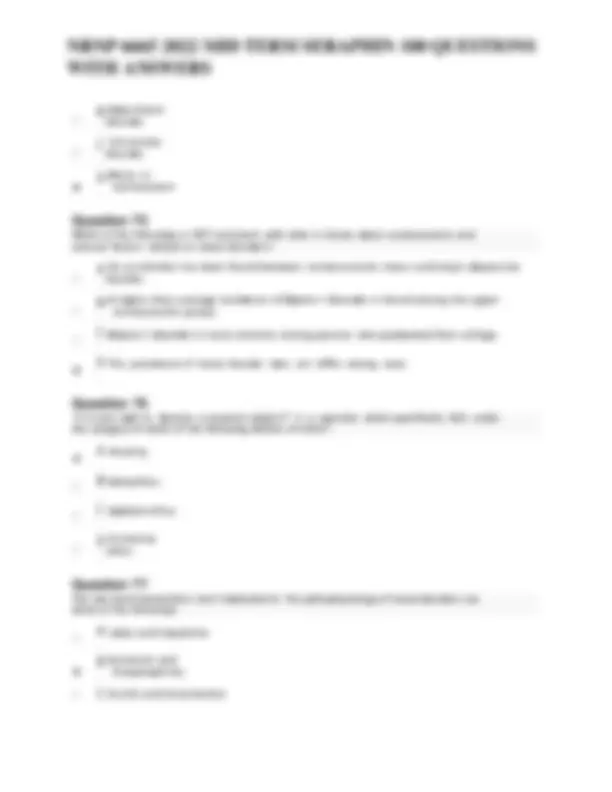
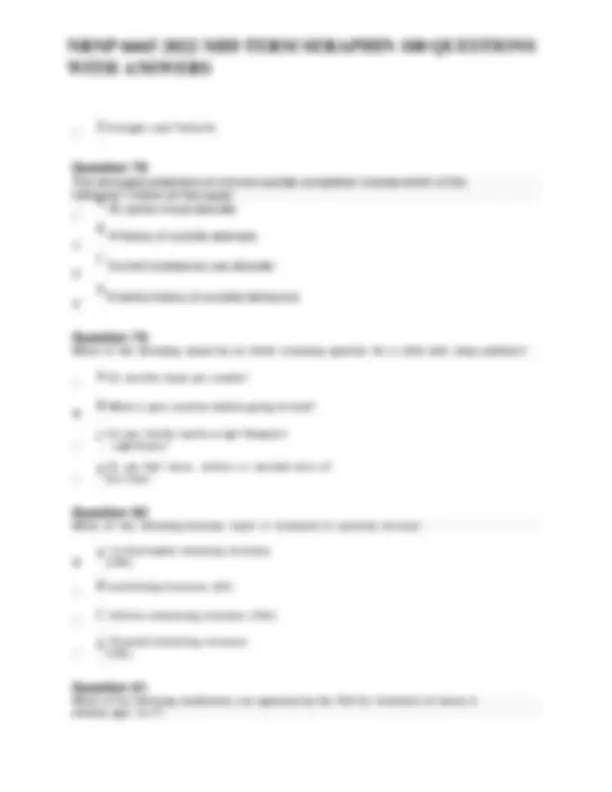
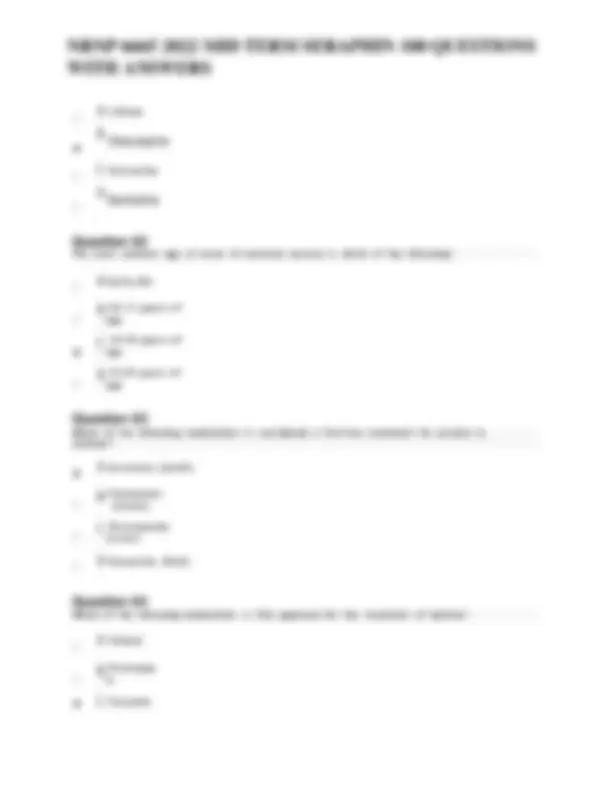
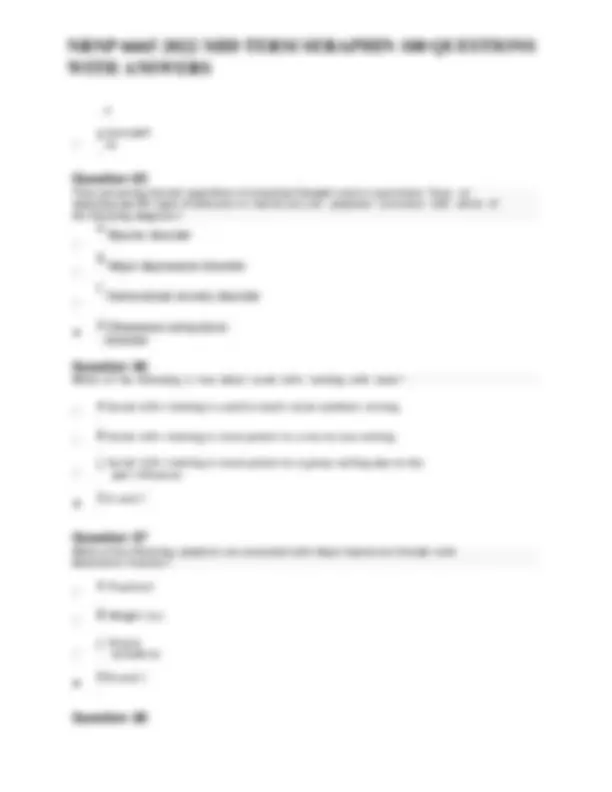
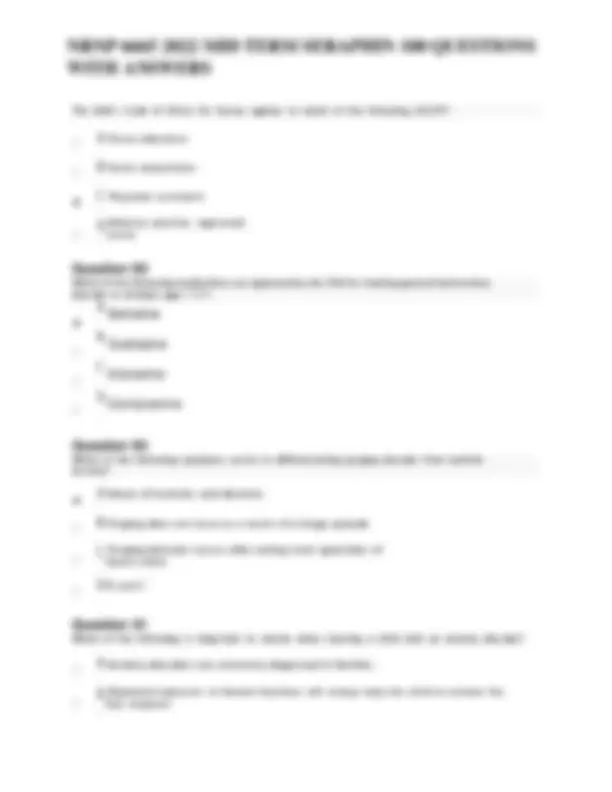
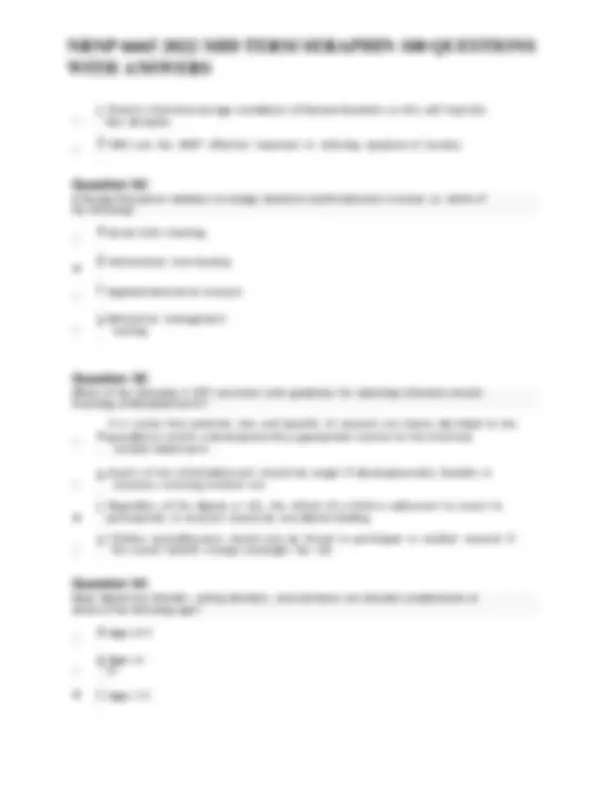
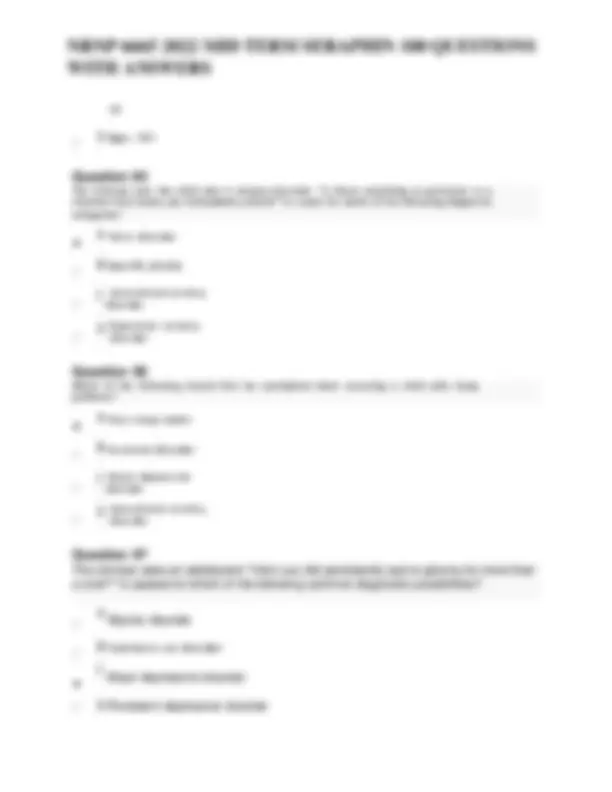
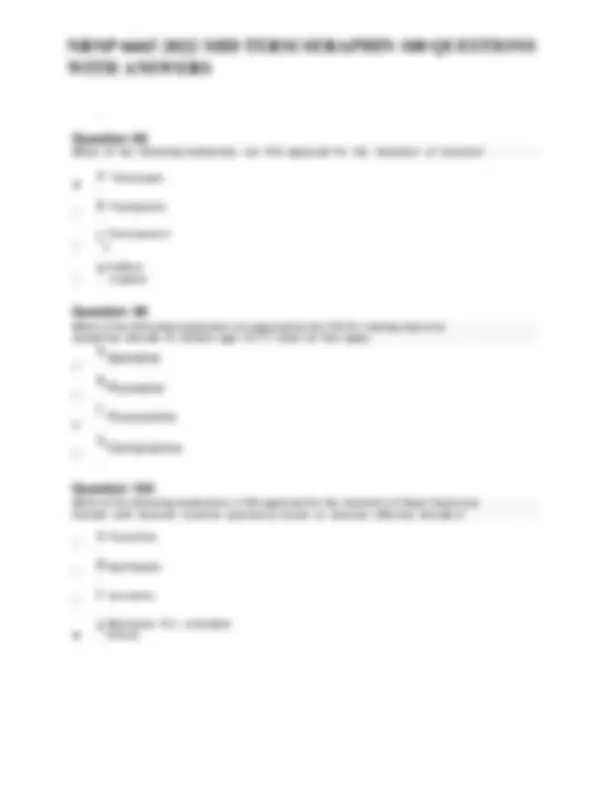


Study with the several resources on Docsity

Earn points by helping other students or get them with a premium plan


Prepare for your exams
Study with the several resources on Docsity

Earn points to download
Earn points by helping other students or get them with a premium plan
Community
Ask the community for help and clear up your study doubts
Discover the best universities in your country according to Docsity users
Free resources
Download our free guides on studying techniques, anxiety management strategies, and thesis advice from Docsity tutors
47 multiple-choice questions and answers related to mental health. The questions cover a range of topics including relaxation therapy, sleep hygiene, eating disorders, and ethical principles. intended for use as a midterm exam for a mental health course. It provides a comprehensive review of key concepts and is a useful study resource for students preparing for the exam.
Typology: Exams
1 / 31

This page cannot be seen from the preview
Don't miss anything!
























Biofeedback, deep breathing, mindfulness, and progressive muscle relaxation are strategies that are typically used in which of the following therapies? According to the APA which of the following are required to support a child’s DSM- 5 diagnosis?
Interviewing
analysis
diagnostic criteria.
settings.
Which of the following is NOT consistent with good sleep hygiene?
computer, etc.
sleep.
Question 4 Which of the following antipsychotic medications have the greatest tendency to increase appetite and body weight?
When assessing a child who has presented with concerns of being anxious and worried, the provider asks the child “Do you get sudden surges of fear that make your body feel shaky or your heart race?” to screen for which of the following common diagnostic possibilities? Which of the following antipsychotic medications has the greatest risk for weight gain and lipid changes? A period of at least one week in which both a manic episode and a major depressive episode occur almost daily is consistent with which diagnosis?
and values.
can be found. Question 8
disorder
disorder
disorder Question 9
(Geodon)
(Abilify)
(Zyprexa)
(Seroquel) Question 10
The theory that depression results from specific thought distortions is consistent with which of the following?
episode
type Question 11 Which of the following is NOT true about symptomatology of anorexia nervosa?
public places.
lack of interest in and resistance to therapy/treatment. Question 12 Sleep-related hallucinations occurring at sleep onset are known as which of the following?
hallucinations
hallucinations Question 13
theory
ADHD, impulse-control, conduct disorder, and intellectual disabilities and anxiety disorders are predominant during which of the following age ranges? The clinician asks the child who is being seen for labile mood “Have you felt really down depressed or uninterested in things you used to enjoy for more than 2 weeks? to screen for which of the following diagnostic categories?
(Prozac)
(Desyrel)
(Elavil)
(Effexor) Question 18 Which of the following is the most common eating disorder?
disorder
syndrome Question 19
Question 20
Which of the following disorders is characterized by episodic bouts of intake of excessive amounts of food but without purging or similar compensatory behavior? During the evaluation of a patient with a history of Bipolar I Disorder, who is manic, the patient states that she is actually the Queen of England and quite wealthy. This is an example of which of the following? A form of cognitive behavioral therapy (CBT) that requires attending skills groups in addition to individual therapy sessions are known as which of the following?
disorder Question 21
disorder
syndrome Question 22
delusion
hallucination
hallucination Question 23
NRNP 6665 2022 MID TERM SERAPHIN 100 QUESTIONS WITH ANSWERS A general term for programs that teach and encourage skillful parent and caregiver responses to challenging child behaviors. Nightmares and night terrors are associated with disorganization and arousal during which stage of sleep? The right to assent of dissent from treatment for a child or adolescent is reflected in which of the following American Academy of Child and Adolescent Psychiatry ethical issues?
Question 27
training Question 28
Question 29
nce Question 30
NRNP 6665 2022 MID TERM SERAPHIN 100 QUESTIONS WITH ANSWERS A 10-year-old child presents with developmentally inappropriate and persistent difficulty with inattention with symptoms which are interfering with academic goals and in social settings. This is consistent with which of the following diagnoses? A patient presents endorsing persistent low-grade (sub-acute) depression for the last several years, uncertain of when it started, thinks he has always been depressed but still goes through the motions. These symptoms are consistent with which of the following diagnoses? Examples of atypical features in a patient with Major Depressive Episode include which of the following?
assistance
crises
Question 31
disorder Question 32
recurrent
Question 33
In the event of a crisis in which the child is threatening to hurt himself, the first steps should include which of the following?
NRNP 6665 2022 MID TERM SERAPHIN 100 QUESTIONS WITH ANSWERS When assessing for substance abuse in an adolescent, the clinician should initially assess for which of the following? Which of the following is consistent with what is known about prevalence of Bipolar I disorder?
ne Question 37
tolerance
disorder Question 38
and women. Question 39
the nurse’s life.
profession.
profession.
Question 40 Which of the following is NOT consistent with what is known about anorexia nervosa? Which of the following is NOT consistent with the code of ethics for the nursing profession?
NRNP 6665 2022 MID TERM SERAPHIN 100 QUESTIONS WITH ANSWERS The mental health practitioner realizes the following about using a behavioral health rating scale? When responding to a family member about the genetic factors related to mood disorders the APRN would share which of the following? Which of the following medications are approved by the FDA for treating OCD in children ages 6 – 17?
engage in binge and purge behaviors Question 41
diagnosis a patient.
Question 42
disorder.
bipolar probands.
factors in mood disorders. Question 43
NRNP 6665 2022 MID TERM SERAPHIN 100 QUESTIONS WITH ANSWERS Which of the following would be consistent with ethical principles regarding relationships with patients in the ANA’s Code of Ethics for Nurses (Provision 1.2)? The domain of ethics concerning the nature of ethics and moral reasoning is known as which of the following? A dissociation between the patient’s experience of sleeping and the objective polygraphy measures of sleep is known as which of the following?
school
Question 48
decisions.
choices.
choices.
Question 49
ethics
Question 50
misperception
NRNP 6665 2022 MID TERM SERAPHIN 100 QUESTIONS WITH ANSWERS The American Academy of Child and Adolescent Psychiatry Code of Ethics Principle II: Promoting the Welfare of Children and Adolescents addresses which of the following ethical issues? Ethical questions about what we “ought” to do or be are addressed within which domain ethics? insomnia
Question 51
nce Question 52
question Question 53 The most powerful predictors of the onset of a depressive episode is which of the following?
disorder
disorder
disorder
NRNP 6665 2022 MID TERM SERAPHIN 100 QUESTIONS WITH ANSWERS
Question 58 Which of the following are medical complications NOT associated with anorexia nervosa?
a
a
n
ia Question 59
Question 60 Hypersomnolence disorder (excessive sleeping) can be caused by which of the following?
regulating sleep
NRNP 6665 2022 MID TERM SERAPHIN 100 QUESTIONS WITH ANSWERS Which of the following questions should be considered prior to prescribing any medication? Strategies that enhance therapeutic engagement include which of the following? Which of the following is true about educating children and their families about their diagnosed mental health disorder? Which of the following BMIs is associated with severe anorexia nervosa?
Question 61
analysis?
Question 62
and appreciated.
Question 63
health.
recommended treatment.
Question 64